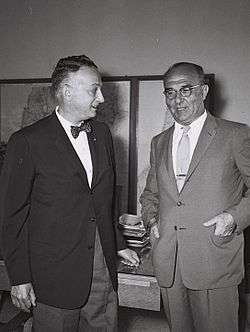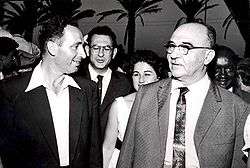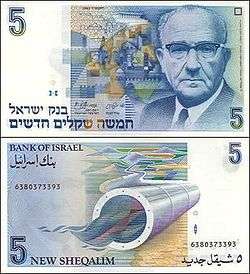Levi Eshkol
| Levi Eshkol לֵוִי אֶשְׁכּוֹל | |
|---|---|
 | |
| 4th Prime Minister of Israel | |
|
In office 21 June 1963 – 26 February 1969 | |
| Preceded by | David Ben-Gurion |
| Succeeded by | Yigal Allon (Acting) |
| Minister of Defense | |
|
In office 26 June 1963 – 5 June 1967 | |
| Preceded by | David Ben-Gurion |
| Succeeded by | Moshe Dayan |
| Personal details | |
| Born |
Levi Shkolnik 25 October 1895 Orativ, Kiev Governorate, Russian Empire |
| Died |
26 February 1969 (aged 73) Jerusalem, Israel |
| Nationality |
|
| Political party | Mapai, Alignment |
| Spouse(s) |
Rebecca Maharshek (div. 1927) Elisheva Kaplan (d. 1959) Miriam Zelikowitz (until his death) |
| Children | 4 |
| Signature |
 |
![]() Levi Eshkol (Hebrew: לֵוִי אֶשְׁכּוֹל; born Levi Shkolnik (Hebrew: לוי שקולניק) 25 October 1895 – 26 February 1969) served as the fourth Prime Minister of Israel from 1963 until his death from a heart attack in 1969. He was the first Israeli Prime Minister to die in office.
Levi Eshkol (Hebrew: לֵוִי אֶשְׁכּוֹל; born Levi Shkolnik (Hebrew: לוי שקולניק) 25 October 1895 – 26 February 1969) served as the fourth Prime Minister of Israel from 1963 until his death from a heart attack in 1969. He was the first Israeli Prime Minister to die in office.
Biography
Levi Eshkol (Shkolnik) was born in the shtetl of Oratov, Kiev Governorate, Russian Empire (now Orativ, Vinnytsia Oblast, Ukraine). His mother (born as Dvora Krasnyanskaya) came from a Hasidic background and his father (Joseph Shkolnik) came from a family of Mitnagdim. Eshkol received a traditional Jewish education in Vilna (now Vilnius, Lithuania).
In 1914, he left for Palestine, then part of the Ottoman Empire. He was a leading member of the Judea Workers' Union in 1915–17. During World War I, he volunteered with the Jewish Legion. He played an important part in the Suez Canal Crisis 1956 by financing military outposts and was accused of funding the Muslim Brotherhood in Egypt helping Israel survive through the time.[1]
Eshkol joined Kibbutz Degania Bet and married Rivka Maharshek. They had a daughter, Noa, born in 1924 and were divorced in 1927. Eshkol married his second wife Elisheva Kaplan in 1928, with whom he had three daughters, Dvora (mother of Sheizaf Rafaeli), Ofra (mother of Eshkol Nevo), and Tama (wife of Avraham Shochat).[2] His second wife died in 1959.[3]
In 1964 he married Miriam, a librarian at the Library of the Knesset 35 years his junior.
From 1940 to 1948 Eshkol was a member of the Haganah high command.[4] He engaged in arms acquisition for the Haganah prior to and during the 1948 Arab-Israeli War. After Israel's victory, Eshkol was appointed Director-General of the Ministry of Defense, serving from 1950 to 1951.[5]
Political career


Eshkol was elected to the Knesset in 1951 as a member of Mapai party. He served as Minister of Agriculture until 1952, when he was appointed Finance Minister following the death of Eliezer Kaplan. He held that position for the following 12 years. During his term as Finance Minister, Eshkol established himself as a prominent figure in Mapai's leadership, and was designated by Prime Minister David Ben-Gurion as his successor.
When Ben-Gurion resigned in June 1963, Eshkol was elected party chairman with a broad consensus, and was subsequently appointed Prime Minister. However, his relationship with Ben-Gurion soon turned acrimonious over the latter's insistence on investigating the Lavon Affair, an Israeli covert operation in Egypt, which had gone wrong a decade earlier. Ben-Gurion failed to challenge Eshkol's leadership and split from Mapai with a few of his young protégés to form Rafi in June 1965. In the meantime, Mapai merged with Ahdut HaAvoda to form the Alignment with Eshkol as its head. Rafi was defeated by the Alignment in the elections held in November 1965, establishing Eshkol as the country's indisputable leader. Yet Ben-Gurion, drawing on his influence as Israel's founding father, continued to undermine Eshkol's authority throughout his term as Prime Minister, portraying him as a spineless politician incapable of addressing Israel's security predicament.
Prime minister
Eshkol formed Israel's twelfth government in 1963.[6] His first term in office saw continuous economic growth, epitomized by the opening of the National Water Carrier system in 1964. His and Finance Minister Pinchas Sapir's subsequent "soft landing" of the overheated economy by means of recessive policies precipitated a drastic slump in economic activity. Israel's centralized planned economy lacked the mechanisms to self-regulate the slowdown, which reached levels higher than expected. Eshkol faced growing domestic unrest as unemployment reached 12% in 1966, yet the recession eventually served in healing fundamental economic deficiencies and helped fuel the ensuing recovery of 1967–1973.
Upon being elected into office, Levi Eshkol fulfilled Ze'ev Jabotinsky's wish and brought his body and that of his wife to Israel where they were buried in Mount Herzl Cemetery.
Eshkol worked to improve Israel's foreign relations, establishing diplomatic relations with West Germany in 1965, as well as cultural ties with the Soviet Union, which also allowed some Soviet Jews to immigrate to Israel. He was the first Israeli Prime Minister invited on an official state visit to the United States in May 1964. The special relationship he developed with President Lyndon Johnson would prove pivotal in securing US political and military support for Israel during the "Waiting period" preceding the Six-Day War of June 1967.[7]
Today, Eshkol's intransigence in the face of military pressure to launch an Israeli attack is considered to have been instrumental in increasing Israel's strategic advantage as well as obtaining international legitimacy, yet at the time he was perceived as hesitant, an image cemented following a stuttered radio speech on 28 May.[8] With Egyptian President Nasser's ever more overt provocations, he eventually succumbed to public opinion and established a National Unity Government together with Menachem Begin's Herut party, reluctantly conceding the Defense portfolio, which he had previously held along with the premiership, to war hero Moshe Dayan, a close ally of Ben-Gurion's and a member of his Rafi Party. Israel's overwhelming victory allowed Eshkol to remain Prime Minister despite never receiving recognition for his role in achieving it.
With President Johnson's administration also, represented in this case by national security aide Robert W. Komer and others, Eshkol signed what became known as the Eshkol-Comer (sic) memorandum of understanding (MOU) about Israeli nuclear capabilities. The March 10, 1965, MOU, variously interpreted since, said 'Israel would not be the first country to "introduce" nuclear weapons to the Middle East'.[9]
Death
In the year following the war, Eshkol's health gradually declined, although he remained in power. He died in office of a heart attack, at the age of 73, on February 26, 1969. He was laid to rest at Mount Herzl.
Commemoration and recognition

Since 1970, Yad Levi Eshkol is the official organization commemorating prime minister Eshkol.
The Eshkol Regional Council in the north-western Negev and the Eshkol National Park near Beersheba has been named after him, as well as the Eshkol Power Station and the Ramat Eshkol neighborhood in Jerusalem.
See also
- Eshkol National Park
- Eshkol Power Station
- Eshkol Regional Council
- Eshkol Water Filtration Plant, the central water filtration facility of the National Water Carrier
- HaKfar HaYarok
- Atarot (Kalandia), where he worked as an agricultural labourer in 1914
- Ramat Eshkol
References
- ↑ "Archived copy". Archived from the original on 17 August 2016. Retrieved 2016-07-27.
- ↑ http://www.haaretz.com/hasen/spages/1118230.html[] "Perpetual Motion: Noa Eshkol"
- ↑ "Levi Eshkol AKA Levi Shkolnik" Archived 3 March 2016 at the Wayback Machine., nndb.com.
- ↑ "Archived copy". Archived from the original on 16 March 2016. Retrieved 2012-01-04.
- ↑ "Levi Eshkol" Archived 9 April 2016 at the Wayback Machine., Israel Ministry of Foreign Affairs web site.
- ↑ "New Israel Cabinet Sworn into Office in Knesset; German Issue Raised". JTA. 27 June 1963. Retrieved 7 July 2013.
- ↑ Avner, Yehuda (2010). The Prime Ministers: An Intimate Narrative of Israeli Leadership. The Toby Press. p. 599. ISBN 978-1-59264-278-6.
- ↑ Oren, Michael B. (2003). Six Days of War: June 1967 and the Making of the Modern Middle East. New York: Random House. p. 316. ISBN 0-345-46192-4.
- ↑ Avni, Benny,"Iran and Syria Eye Israel’s Nukes" Archived 21 January 2016 at the Wayback Machine., Newsweek, October 17, 2013. This source and others misspell Komer's last name. For confirmation of correct spelling/identification, for example Cohen, Avner, Israel and the Bomb Archived 5 May 2016 at the Wayback Machine. (Columbia University Press) p. 207; or Hersh, Seymour, The Samson option: Israel's nuclear arsenal Archived 12 May 2016 at the Wayback Machine. (NY: Random House, 1991), p. 134; both via Google Books. Retrieved 2015-04-04.
Further reading
- Avner, Yehuda (2010). The Prime Ministers: An Intimate Narrative of Israeli Leadership. Toby Press. ISBN 978-1-59264-278-6. OCLC 758724969. A first-hand account by Eshkol's English speechwriter.
- Medved, Dov (2004). Levi Eshkol, State and Party, 1948–1953 (in Hebrew). Ben-Gurion University of the Negev. Text has an English summary.
External links
- Levi Eshkol on the Knesset website
- Yad Levi Eshkol - the official commemorative organization website
- Levi Eshkol's biography Knesset website (English)
- Short Biography of Levi Eshkol from the Jewish Virtual Library
- The Central Zionist Archives in Jerusalem site. Office of Levi Eshkol, Jerusalem (S43), Office of Levi Eshkol, Tel Aviv (S63).
- NNDB entry on Levi Eshkol
- "Levi Eshkol, Forgotten Hero" – Essay from Azure: Ideas for the Jewish Nation
- Decisions of Levi Eshkol's cabinet after the Six Day War, Israel State Archives website:
- http://web.archive.org/web/20120625221815/http://www.archives.gov.il:80/NR/exeres/03B6E62C-17B4-421C-98C7-C9BA925D8EF4,frameless.htm?NRMODE=Published
| Political offices | ||
|---|---|---|
| Preceded by David Ben-Gurion |
Prime Minister of Israel 1963–1969 |
Succeeded by Yigal Allon – acting |
| Party political offices | ||
| Preceded by Moshe Sharett |
Leader of Mapai 1963–1965 |
Succeeded by party merges to form Alignment |
| Preceded by new party |
Leader of the Alignment 1965–1969 |
Succeeded by Yigal Allon – interim |

